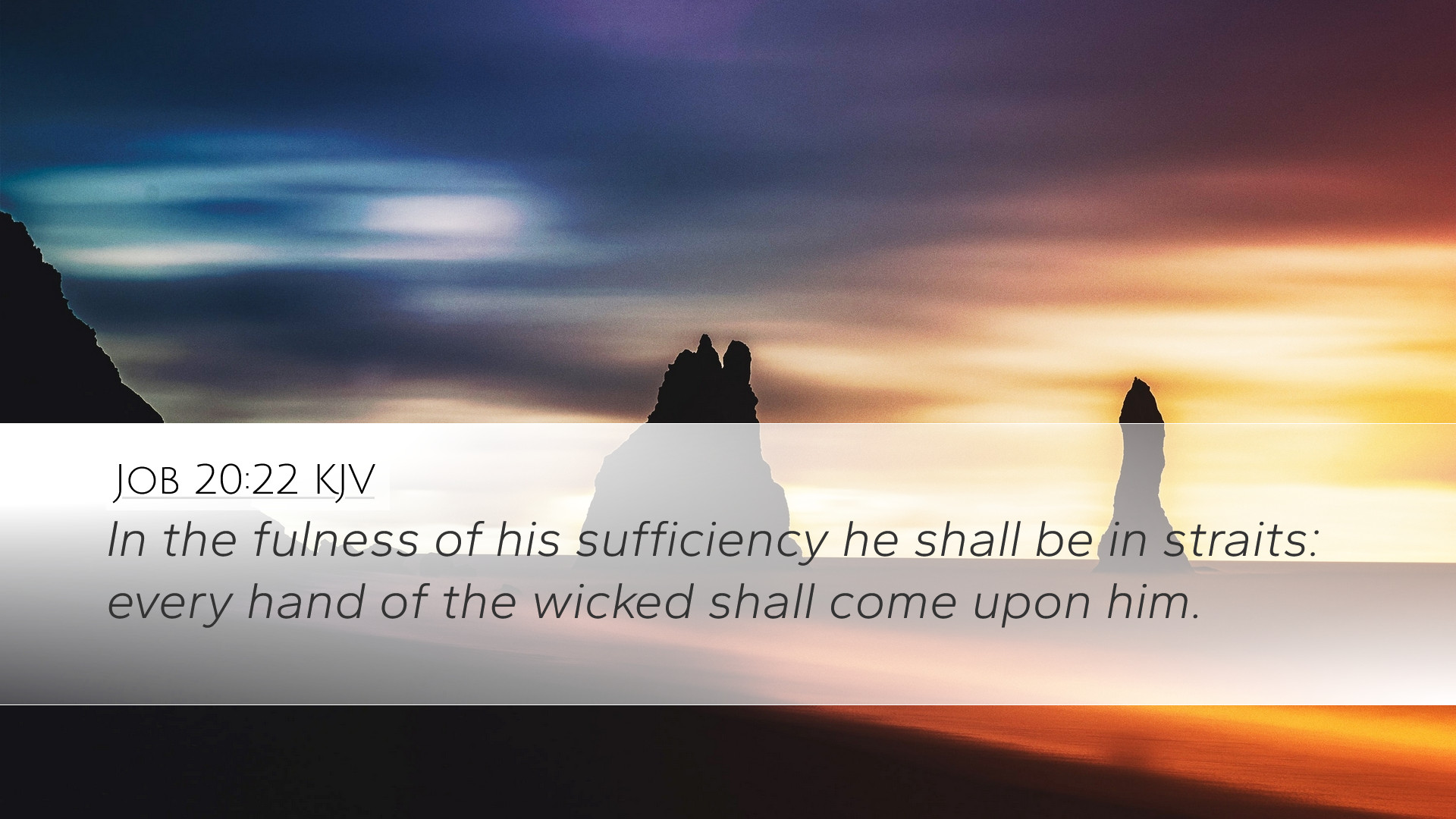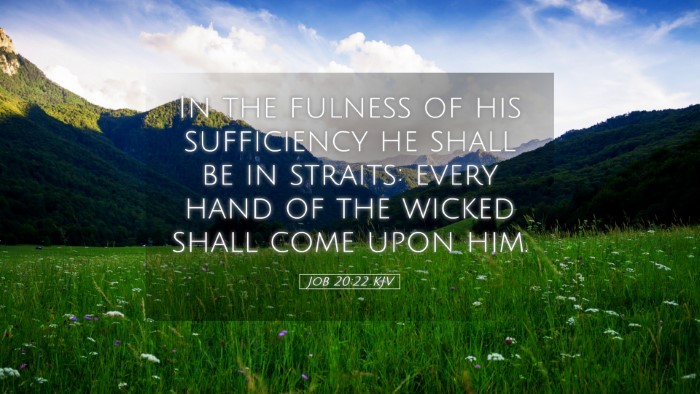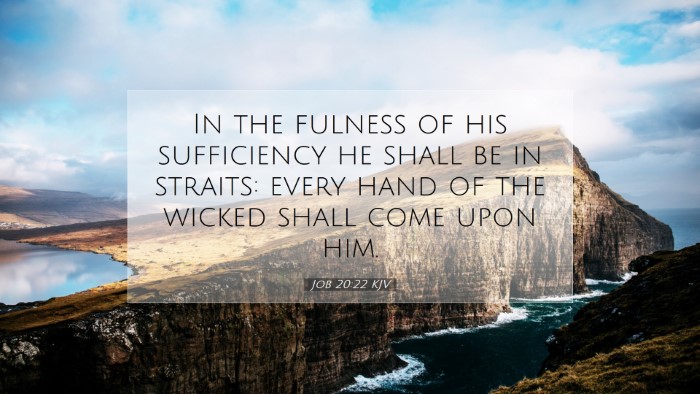Old Testament
Genesis Exodus Leviticus Numbers Deuteronomy Joshua Judges Ruth 1 Samuel 2 Samuel 1 Kings 2 Kings 1 Chronicles 2 Chronicles Ezra Nehemiah Esther Job Psalms Proverbs Ecclesiastes Song of Solomon Isaiah Jeremiah Lamentations Ezekiel Daniel Hosea Joel Amos Obadiah Jonah Micah Nahum Habakkuk Zephaniah Haggai Zechariah MalachiJob 20:22
Job 20:22 KJV
In the fulness of his sufficiency he shall be in straits: every hand of the wicked shall come upon him.
Job 20:22 Bible Commentary
Commentary on Job 20:22
Job 20:22 states: "In the fulness of his sufficiency he shall be in straits: every hand of the wicked shall come upon him."
Overview and Context
The book of Job addresses the profound questions of suffering, righteousness, and divine justice. In chapter 20, we witness a shift in dialogue where Zophar the Naamathite responds vehemently to Job's lamentations. His perspective is driven by a retributive theology which asserts that the wicked will ultimately face judgment.
Commentary Insights
Matthew Henry
Matthew Henry argues that this verse captures a profound irony within the prosperity of the wicked. He emphasizes that despite the seeming fullness and prosperity they enjoy, they are ultimately destined for hardship and ruin. Henry notes:
- The Fulness of His Sufficiency: This signifies the extent to which the wicked believe they have achieved success. Their momentary prosperity is deceptive, leading to isolation and straits once divine judgment arrives.
- Straits: Henry elaborates that “straits” symbolizes distress and undoing that follows the fleeting pleasures of sin. The wicked may indulge in abundance, but it will not insulate them from suffering in the coming days.
Albert Barnes
Albert Barnes further explores the implications of the phrase "every hand of the wicked." He posits that the inevitable downfall of the wicked serves as an assurance of God’s justice. Barnes provides several key insights:
- Inescapable Divine Justice: The wicked cannot fully escape judgment, as the Scriptures affirm that they will encounter difficulties when they reach the peak of their endeavors. Barnes emphasizes that God’s order in the universe ensures that evil cannot flourish indefinitely.
- Social Evil: The presence of the phrase "every hand of the wicked" suggests a collective judgment that the wicked may face from their peers as well as from divine retribution. Such communal strife highlighted by Barnes underscores the consequences of living out of alignment with God’s will.
Adam Clarke
Adam Clarke comments extensively on the theological significance of the verse. He interprets Zophar's proclamation as a reflection of the moral view of the world in which the prosperity of the wicked is fleeting and ultimately followed by desolation. Clarke outlines several points of discussion:
- Temporal vs. Eternal Reality: Clarke emphasizes that temporal prosperity often stands at odds with eternal truths. The wicked may experience success, but it is short-lived compared to the eternal consequences of their actions.
- Divine Retribution: Clarke underscores a broader biblical theme, asserting that God's oversight ensures that the wicked will not evade the repercussions of their deeds forever. Their sufficiency becomes a source of stricture when faced with ultimate accountability.
Theological Reflections
This verse serves as a stark reminder to both believers and non-believers about the transient nature of earthly treasures. It encourages reflection on the theme of ultimate accountability before God. The teachings from Henry, Barnes, and Clarke collectively indicate that:
- God’s Justice is Unyielding: Regardless of how it seems initially, divine justice will manifest. This foundational belief provides hope and encouragement amid suffering for those who are righteous.
- The Illusion of Security: The apparent security and success of the wicked are illustrated as a façade; it is critical for the faithful to maintain their integrity without yielding to the temporary successes of the unrighteous.
- Preparation for Justice: Pastors and theologians are encouraged to prepare congregations to understand that living in righteousness does not always yield immediate rewards and that patience is vital in the walk of faith.
Conclusion
In summation, Job 20:22 serves as a profound theological reflection on the nature of wealth, suffering, and divine justice. Henry, Barnes, and Clarke collectively remind us that while the wicked may experience temporary sufficiency, the ultimate reality is one of accountability before God. As students and scholars engage with this text, the emphasis remains on the importance of enduring righteousness and the hope of eventual divine justice.


